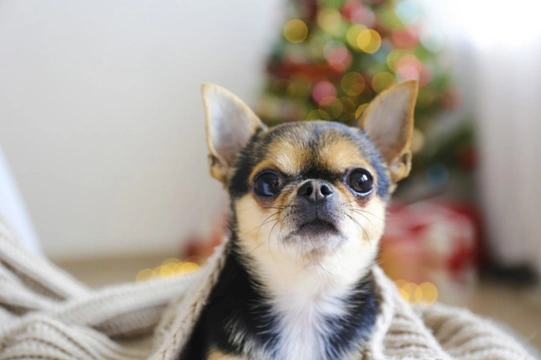
Five more frequently asked questions from dog owners at Christmas
Vets, veterinary nurses, the Pets4Homes forum and the internet-at-large are just some of the places that dog owners go to ask questions about looking after their dogs and to check if certain things they want to do or change are ok.
When it comes to Christmas in particular, there are a range of common questions that come up time and time again in terms of keeping dogs safe at Christmas and caring for them appropriately over the festive period as a whole. Asking such questions and taking special care to keep your dog safe is a sign of responsible pet ownership, but it is important to ensure that the answers you get are reliable too, as simply asking a range of different dog owners might get you a range of different answers!
We’ve already answered some of the most common questions dog owners ask a Christmas in another post, and so in this article we’ll cover the answers to five more frequently asked questions from dog owners at Christmas. Read on to learn more.
How do you keep your dog away from the Christmas tree?
Whether your tree is real or artificial, it is likely to get your dog’s attention when you bring it into the house; whether they see it as an intruder, a new toy, or an indoor toilet facility if you’re really unlucky!
Artificial trees are safer to have around dogs than real pine ones, as pine needles are mildly toxic as well as sharp; but your dog should be kept at a safe distance from the tree in general to ensure they don’t knock or pull it down, or get hurt.
Don’t put decorations containing chocolate or other foodstuffs on the tree, nor any presents containing food under it! Close the dog out of the room when they cannot be supervised, and work on your dog’s training commands with “no” and “leave it.”
What shouldn’t you feed your dog at Christmas?
The vast majority of new and novel foods we bring into the home at Christmas can be harmful to our dogs, some of it directly and some of it by virtue of being too rich, fatty, salty or full of sugar. In terms of what you shouldn’t feed your dog at Christmas, really anything outside of the norm is best avoided.
Ultimately, anything new and seasonal that your dog wouldn’t normally be allowed to eat should be off the menu for them at Christmas too; and rather than thinking about what your dog shouldn’t be eating, try to think about what they should; which is a balanced, measured diet with dog-safe treats factored into it.
Giving your dog a small piece of lean turkey or other meat that has not been cooked with onion, garlic or other toxins is fine, but a wide range of Christmas foods including Christmas pudding, mince pies, anything containing alcohol, chocolate, many types of nuts and much more are all harmful to dogs.
Can dogs have gingerbread?
Gingerbread is a favourite Christmas treat for many of us, and something we often enjoy making and icing at home during the festive season too, perhaps to give as gifts or hang on the tree.
So, can dogs have gingerbread at Christmas? Well, gingerbread isn’t a good, healthy or appropriate dog treat nor something you should deliberately give to your dog as there are many better alternatives, but if your dog has eaten a piece of gingerbread inadvertently, it won’t be toxic for them.
Can dogs have Christmas cake?
A really common question is “can dogs have Christmas cake”, or Christmas pudding, or other variants of heavy fruit-based sweet foods many of us enjoy during the holiday season.
The answer to this is that dogs cannot eat Christmas cake safely because it contains dried fruits including raisins and sultanas, which are toxic to dogs. Christmas cake also commonly contains alcohol, which is also toxic to dogs; and such food is very rich and sugary as well!
Is tinsel dangerous for dogs?
The decorations you pick to go on your tree when you have a dog should be selected with care to make sure they’re not dangerous, and as mentioned earlier on, chocolate and other food should be avoided!
However, not all dog owners know that tinsel shouldn’t really be used to decorate a tree a dog is in reach of, as if it attracts your dog’s attention it can actually pose a hazard to their health.
Tinsel is held together with wires or strings and has lots of loose parts that shed, and all of these things make it very easy for a dog that is playing or being silly to ingest tinsel accidentally, which can potentially cause a blockage or acute problem for them.
Restrict tinsel decorations to high up out of your dog’s reach, and ensure that they are very secure so that they can’t fall down or drop to within reach of your dog.



